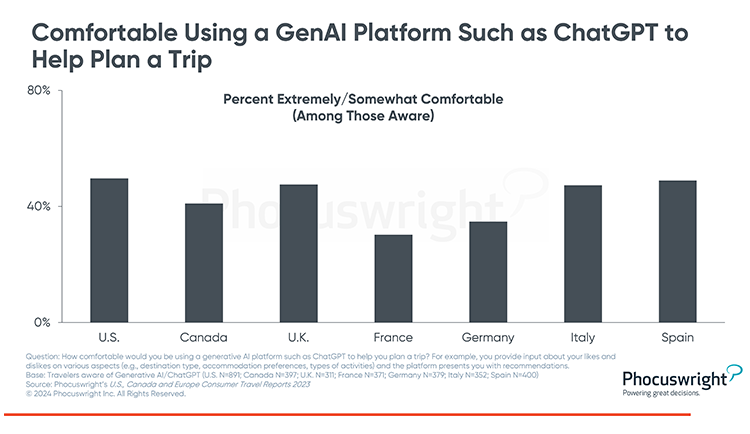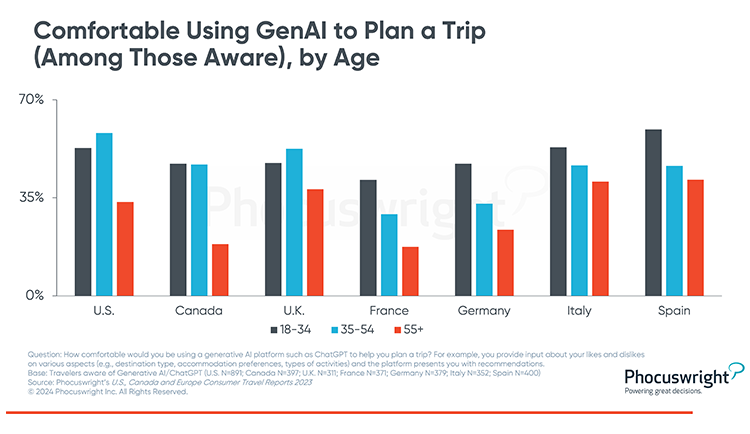Travelers’ comfort using GenAI tech
- Published:
- January 2024
- Analyst:
- Phocuswright Research
Given the widespread knowledge and interest in using technologies like GenAI, VR and AR among today's travelers, travel brands should continue down the path toward integrating them into the ways in which travel can be planned, booked and experienced. In doing so, they should make a concerted effort to ensure that all interactions are safe, private and as convenient as possible.
In addition to travelers' broad awareness of generative AI - and despite some of the "doom and gloom" scenarios painted in the media about the potential dangers of the technology - a significant share of those who are aware of it report they would be extremely or somewhat comfortable using a GenAI tool to help them plan a trip. For example, according to Phocuswright’s latest travel research report GenAI and Emerging Tech Use Among Travelers, nearly half of travelers would be comfortable in a chatbot interaction where they provide their trip preferences and the AI platform offers a range of recommendations (see figure below). French and German travelers were the least likely to be comfortable with this application.
As with all nascent technology, early adopters for travel skew younger. When it comes to comfort level with using generative AI to help plan a trip, those most comfortable are more likely to be under 55 in the U.S., Canada and the U.K., or under 35 in France, Germany and Spain (see figure below). Overall, the youngest travelers seem the most comfortable, with the exceptions being the U.S. and U.K., where the 35-54 cohort express the greatest comfort. Notably, young Spaniards are by far the most likely to indicate ease/comfort in incorporating AI into their travel planning process.
The ability to use natural language sets GenAI applications up for high adoption. Many of the early use cases in travel are unobtrusive and don't require users to learn any new skills or open any new accounts. This confers an inherent advantage for brands looking to leverage the capabilities and introduce features powered by AI.
This article is derived from the findings of Phocuswright’s 2023 consumer travel surveys in Europe, Canada, and the United States, and explores travelers’ awareness of and attitudes toward GenAI and other emerging technologies. Key topics addressed include:
- Overall traveler awareness regarding recent tech developments including GenAI, virtual and augmented reality
- Discussion of traveler comfort engaging with these technologies
- Where applicable, breakdown of trends by consumer demographic, including age, gender and geographical origin
- Suggestions on how travel companies can best leverage these technologies, as consumers become more comfortable with adoption
For further intelligence for you and your entire company, subscribe to Phocuswright Open Access. This subscription puts the entire Phocuswright research library and powerful data visualization tools at your fingertips. There’s a reason executives around the world trust and reference Phocuswright research and data on a daily basis. Explore for yourself why.
Plus, we just redesigned Phocal Point, the powerful data visualization tool that now makes it easier to access and interpret Phocuswright data.
It's all about the data. With an updated navigation interface, new dynamic filtering, additional segment and channel breakouts in select markets and rich detailed views of 35+ markets, Phocal Point allows you to create custom interactive charts and view travel data by segment, channel, device, region and country. Our proprietary travel industry market sizing data allows you to look to the future with projections through 2026, and review historical data as far back as 2009.













